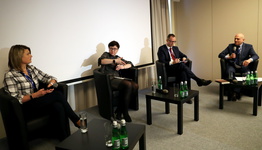CASE partners with the 18th Conference of the Chamber of Brokerage Houses
CASE - Center for Social and Economic Research, was the institutional partner of the 18th Conference of the Chamber of Brokerage Houses, held March 9-11 in Bukowina Tatrzańska.
CASE hosted a panel titled Risks to the development of Poland’s capital market: the challenge of employee qualifications and diversity, whose participants included Dr. Jarosław Bełdowski, counsel at Dentons; Dr. Agnieszka Chłoń-Domińczak of the Institute of Statistics and Demography of the Warsaw School of Economics; Dr. Izabela Styczyńska, vice president of the CASE management board; Piotr Teleon, deputy director of the brokerage house Dom Maklerski Pekao; and Tomasz Prusek, management board president of the Friendly State Foundation.
The purpose of the panel was to analyze the challenges facing the financial sector that arise from changes in supply of and demand for qualifications and diversity among employees. Questions raised during the discussion included the employment and pay gap between men and women in the sector; the attractiveness of employment in the sector for young people; the role of outsourcing centers in making the sector more attractive; and the influence of automation on new skills and increasing the sector’s attractiveness.
The panelists drew attention to the following aspects:
- increasing difficult of working with Millennials (Generation Z), and decreasing effectiveness of traditional methods in educating them. It is very difficult for financial-sector employers to meet the needs and expectations of young people – not only in terms of salary, but also working conditions (frequent need for remote working). Young people in turn do not meet the expectations of financial-sector employers, as they are insufficiently flexible, responsive and loyal;
- supply of labor should be adjusted to demand, and since foreign companies see potential to build back offices on the Polish market, we should make it easier for them;
- our aspirations shouldn’t end with what companies require from us, but we should go a step further and prepare our staff to increase competitiveness and productivity. We should also create conditions for foreign companies to invest in very productive tasks, e.g. by creating conditions for the development of the middle office;
- robotic process automation (RPA), the development of artificial intelligence, and, which follows, changes in demand for various kinds of skills. It is indicated that RPA and AI are contributing to machines taking over tasks such as client service, document verification and control, creditworthiness assessment, legal and credit verification, portfolio allocation decisions, operational activation of accounts in trade and settlement systems and operational configuration of accounts in trade. Thus the skills that will be sought on the labor market are specialized analytical and programming abilities allowing the implementation and support of RPA and AI processes; emotional intelligence; evaluation and decisionmaking; service orientation; negotiations and cognitive flexibility; and problem-solving skills. The panelists noted that automation will have a positive effect on the shortages of personnel and skills in the financial sector in low-level, repetitive and analytical positions.
The panelists also stressed that the most important challenge is to build a flexible education system, which would allow rapid adjustment of young people’s qualifications and skills to the needs of the market. Additionally, they pointed to the need to strengthen working relationships between the private sector, educational institutions and the third sector, because this is the only possible way to minimize risk to the development not only of the financial sector but of all other sectors exposed to staff shortages and an appropriately qualified administration, and adjusting people’s qualifications to companies’ needs.
Comments from the hall also addressed the question of the educational system’s ability to adapt its educational offerings more quickly.




